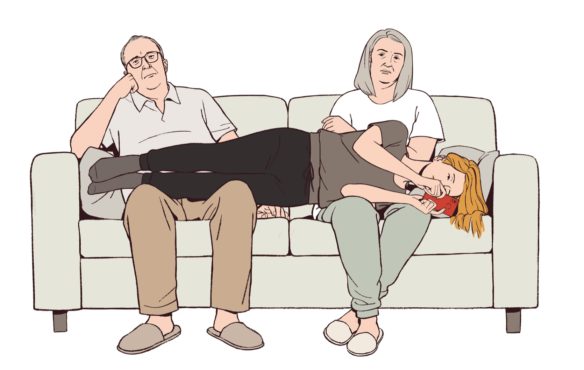
A couple of years ago, the Church launched a series of Self Reliance workshops. These can help individuals and families understand their current status and future, then take action to provide for a future that will be a blessing to themselves and others.
As I have participated in numerous Self Reliance workshops in the past two years, I was interested to read Friday’s article in Barron’s by Reshma Kapadia describing the alarming burden older Americans are shouldering on behalf of their adult children.
When does helping an adult child go from compassion to willing participation in exploitation? When does helping children, grandchildren, and friends go from being helpful to debilitating the very individuals we seek to help?
Screening Decisions
How do we determine if help for adult children and other loved ones is appropriate?
Luckily, delightfully smart people have been working this for years. Dr. Peter Lichtenberg has spent decades advancing the scientific understanding of how and why older adults experience financial exploitation. His work at Wayne State University has produced Financial Screening Tools which can allow front-line professionals, friends, and family members understand how to determine when financial decisions are appropriate and when they are not.
You don’t have to suffer from dementia for your decision-making to become questionable. Undue influence when paired with ignorance of consequences can lead to catastrophic decisions, no matter your “ability.”
Understanding Impact of Choices
Consider the case of a woman nearing retirement who owns her own home. An adult child is struggling and has convinced the mother that it would be a great idea if the mother would give the family home to the adult child.
In another example, an extended family values regular reunions, where adult children and grandchildren can gather. These reunions are held in a location near the grandparents and every family is expected to pay their own way. But one adult child now has several children and lives thousands of miles away.
In each of these two cases, the argument is that the person being asked to spend or give resources must do so because the alternative obviously demonstrates a lack of love. And we all hate to be accused of being stingy, hard-hearted individuals.
But what is our reality? I expect that is why all the Self Reliance workshops ask participants to track their spending in detail for at least a month. You need to know what your financial reality is, whether you are focused in personal finances, education, getting a better job, or starting/growing a business.
What is Freedom?
Some of us dislike spending the effort to understand our financial reality. We have other things we’d rather do.
But when we are ignorant of our financial reality, there is an underlying fear. There’s a reason Dave Ramsey calls his program Financial Peace University. The Church Self Reliance program similarly has a track record of creating a sense of peace and commitment in those who diligently participate in the workshops and complete the assignments.
Freedom from fact is not really freedom.
Caring Compassion with Limits
We have a friend who is developmentally delayed. He calls and e-mails regularly, sharing joys and concerns as well as asking for rides and money.
Earlier this year, he called to tell us how excited he was to donate $1000 to a charity. Concerned, we asked if that was appropriate. We urged him to ensure he had enough for his living expenses. We suggested he call his parent and consider either not making any donation or at least donating a smaller amount.
A week or so ago, the friend called. He had donated the $1000 to the charity. But now he didn’t have anything to buy food, and he didn’t have much in his pantry.
We reasoned with him. While we would have been happy to bring over some leftovers, it appeared he had enough food to make it until he could talk with his father.
There is a middle ground between doing all that a loved one asks and refusing to help at all. When we know our own situation and limits, we can be compassionate while also ensuring that we do not “help” more than we are able, or in ways that would harm the loved one.
Next Steps
If you have not yet participated in a Self Reliance workshop, I strongly urge you to seek one out and sign up. This is a program that can benefit almost anyone (my developmentally delayed friend being one of the possible exceptions). You will learn skills that will empower you to lean on the Lord and take responsibility for yourself.
The world needs you to become the best you can be. As Elder Renlund explained, “God is not interested in His children just becoming trained and obedient ‘pets’ who will not chew on His slippers in the celestial living room. No, God wants His children to grow up spiritually and join Him in the family business.”[ref]Dale Runlund, “Choose You This Day,” October 2019, available at https://www.lds.org/general-conference/2018/10/choose-you-this-day?lang=eng.[/ref]
When we have completed this life, will we be able to report back that we have been the best of friends and children? Will we be able to report that (where applicable) we have been the best of parents and workers? In reflecting on our falls, will we be able to report that we picked ourselves up and recovered as best as possible through obedience and trust in God and our fellows?
Go forth and do good. But make sure that in doing good, you know what that means for you and those you love.